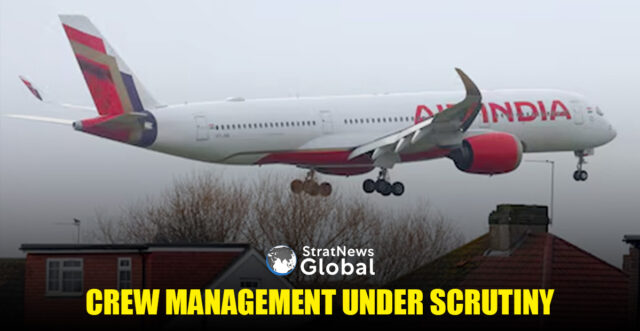India’s aviation regulator, the Directorate General of Civil Aviation (DGCA), has warned Air India it may face enforcement action for violating safety standards on crew fatigue management and training, according to government notices reviewed by Reuters.
The airline self-reported the problems, which occurred this year and last year, to the DGCA last month, just days after one of its Boeing 787 Dreamliners crashed in Ahmedabad city, killing 260 people.
Four government notices, dated July 23, criticised Air India for repeated failures in safety compliance and follow many other warnings in the past. Potential regulatory action could include fines or ordering that executives be removed from their jobs.
They cite a combined 29 violations, including pilots not being given mandatory rest, poor compliance with simulator training requirements, lack of training for a high-altitude airport and flying on international routes with insufficient cabin crew.
“Despite repeated warnings and enforcement action of non-compliance in the past, systemic issues related to compliance monitoring, crew planning, and training governance remain unresolved,” said one of the notices.
“The recurrence of such violations suggests a failure to establish and enforce effective control mechanisms,” it said.
Air India said in a statement that the notices related to voluntary disclosures made over the past year, and it will respond to the regulator.
“We remain committed to the safety of our crew and passengers,” it added.
The DGCA did not respond to a Reuters request for comment.
Investigations And Warnings
Air India has come under intense scrutiny since the Ahmedabad crash, which was the world’s worst aviation disaster in a decade.
A preliminary report found that the fuel control switches were flipped almost simultaneously after takeoff, and there was pilot confusion in the cockpit. One pilot asked the other why he cut off the fuel, and the other responded that he hadn’t done so, the report said.
Separately, the EU’s aviation agency said this month it will investigate Air India Express, the airline’s budget service, after Reuters reported the carrier did not change the engine parts of an Airbus A320 in a timely manner.
India’s watchdog also found in May that Air India flew three Airbus planes even though they were overdue for checks on emergency equipment.
The crash and the warning notices have increased challenges for Indian conglomerate Tata, which took over the airline from the government in 2022 with the aim of turning it into a world-class airline.
This week’s government notices were addressed to senior executives, including the airline’s director of flight operations, Pankul Mathur, and its director of training, Amar Bhatia.
One of the notices said there had been “weekly rest violations” detected for two pilots in June 2024 and one in June 2025, though it did not say how many extra hours the pilots flew.
Another notice said that last year, two pilots took simulator training but did not start flying within the prescribed time limit, a lapse that requires them to undergo training again.
In April this year, a pilot flew from Kathmandu without the mandatory special simulator training required for the airport, the notice added. Kathmandu has mountainous terrain and a high-altitude table-top runway. Table-top runways have steep drops at one or both ends.
“This is substantially risky because Kathmandu is an airport which requires prior training … in case of any emergency (pilots) will not have the time to peruse a manual,” Vibhuti Singh, a former legal expert at India’s Aircraft Accident Investigation Bureau.
The warnings also included concerns that cabin safety teams has “repeatedly failed to adhere” to rules, as four international flights in April and May this year flew with fewer cabin crew than the 15 required.
One senior Indian government official with direct knowledge of the notices said the administration was concerned that “Air India is taking things for granted”, adding, “we have given them many warnings.”
Air India received nine warning notices in the past six months, the government told parliament this week. Last year, authorities warned or fined airlines in 23 instances for safety violations. Eleven instances involved the Air India group.
(With inputs from Reuters)





